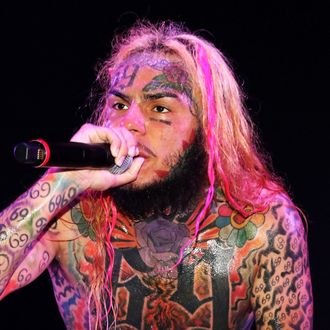
Rappers on trial over the past few years have brought attention to a trend where prosecutors use song lyrics, often depicting violent or criminal activities, as evidence. Two New York lawmakers now want to nip that trend across the state. Senators Brad Hoylman and Jamaal Bailey, Democrats from Manhattan and the Bronx, respectively, introduced a new bill titled “Rap Music on Trial” on November 17. The bill would limit the way all art, including rap lyrics, can be used in trial, unless it can be proven that the art is literal, factual, and relevant, in addition to providing a “distinct probative value” to the case. In a press release on the bill, Hoylman and Bailey specifically cited Tekashi 6ix9ine, the New York rapper whose lyrics were “used to compel Hernandez into becoming a government witness to avoid harsher sentencing” in the high-profile 2019 Nine Trey Gangsters trial. They also note a 2021 ruling in Maryland, in which an appeals court upheld the way rap lyrics were submitted as evidence in the murder trial against Lawrence Montague.
The most notable example of the phenomenon was the case of California rapper Drakeo the Ruler, whose lyrics were used in a case regarding a 2016 murder, and led to him spending years in prison despite being ultimately acquitted. “I didn’t even think they could do that,” he told Rolling Stone of prosecutors using his lyrics, in a story on the new bill. “I have never seen rap lyrics used in such a convoluted and distorted way to try to [imply] guilt against somebody who they had little to no evidence committed the crime,” his lawyer, John Hamasaki, added. Rappers including Killer Mike, Chance the Rapper, Meek Mill, 21 Savage, and Fat Joe spoke out against using rap lyrics as evidence in 2019, submitting an amicus brief in a trial brought by Pennsylvania rapper Jamal Knox, a.k.a. Mayhem Mal, who was previously sentenced to two years in prison after a separate trial that involved his lyrics.
In a statement on the bill, Bailey noted that “the use of rap and hip-hop lyrics in particular is emblematic of the systemic racism that permeates our criminal justice system.” He continued, “In many cases, even the mere association with certain genres, like hip-hop and rap, leads to heightened scrutiny in the courtroom and is used to presume guilt, immorality, and propensity for criminal activity.” Hoylman told Rolling Stone he thinks the bill can be signed by June 2022, adding he’d “love to see it become law next session.”


